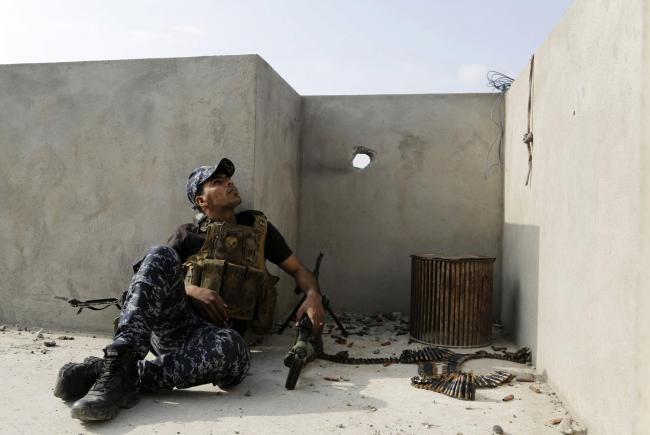Caught in the pincers, Iraqi Christians are the world’s forgotten people
 An Iraqi federal police solider holds a position on a roof of a house in on the edge of Mosul’s Mamun neighborhood on Friday, March 3, 2017. AP Photo/Susannah George)
An Iraqi federal police solider holds a position on a roof of a house in on the edge of Mosul’s Mamun neighborhood on Friday, March 3, 2017. AP Photo/Susannah George)
THE battle for western Mosul, the last major stronghold of Islamic State (IS) in Iraq, is now happening (“Misery and mayhem amid the death rattle of the IS caliphate”, The Herald, March 3). The question that should be asked in the West is not “can we defeat IS?” but “will the Middle East ever be the same again?” In particular, will cities like Mosul – where for centuries Sunni Muslims, Shi‘a Muslims and Christians lived alongside each other – ever exist again? Or are we now seeing the virtual disappearance of ancient Christian communities from the Middle East along with the diversity and tolerance their existence at least demanded, if not always achieved?
When IS seized Mosul and the surrounding Nineveh Plains in summer 2014 an estimated 200,000 Christians fled. Yet many are now afraid to go back. Many of those who lived in Mosul itself fled with nothing except the clothes they were wearing. Those who stayed were later given 24 hours to either convert to Islam, leave or be executed. Christians’ houses were marked with the Arabic letter nun meaning Nazarene – that is, Christian – and either used by IS or auctioned off to Muslim neighbours they had lived alongside for generations. Those are the people who are now living in the houses that belonged to the Christians who fled Mosul.
In the rural areas Christians face different problems. Many of the villages were predominantly Christian. However, even if the security situation improves, which is uncertain, it will be far from easy for them to return. The irrigation channels they depend on will have collapsed and, as in any war zone, they cannot go back to farming until both the land and the canals have been cleared of mines. Experience from countries such as Afghanistan suggests that may take years or even decades.
However, the security situation itself may well be the biggest factor. Even before the emergence of IS, Christians were being specifically targeted in Iraq. According to the 1987 Iraqi census there were 1.4 million Christians in Iraq, many living in cities such as Mosul and Baghdad, where they played a major role in society. Yet, the hostility that followed the 1990-91 Gulf War and then the targeted bombings of churches, abduction and murder of prominent Christians and clergy that followed the US-led invasion of Iraq in 2003 have led the majority to flee the country.
Most of those who fled Mosul now live as internal refugees around Erbil in the Kurdish region of Iraq. It is not their home. Yet, after Mosul is liberated it may be no easier to them to go back “home” than it was for German Jews who survived the holocaust to return home to Germany at the end of the Second World War.
The western world must wake up to this tragedy. The reality is that when Mosul is “liberated”, and even when IS is defeated, there are likely to be vast numbers of Iraqi Christians who will still be refugees. They are the world’s forgotten people.
B McKenna,
Overtoun Avenue, Dumbarton.
http://www.heraldscotland.com/opinion/15133497.Caught_in_the_pincers__Iraqi_Christians_are_the_world___s_forgotten_people/
